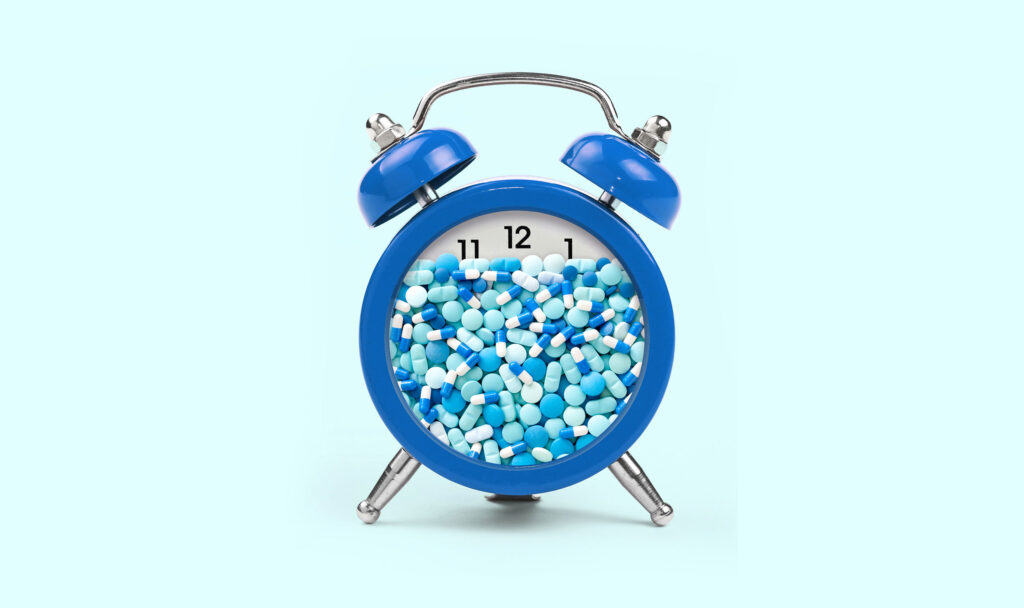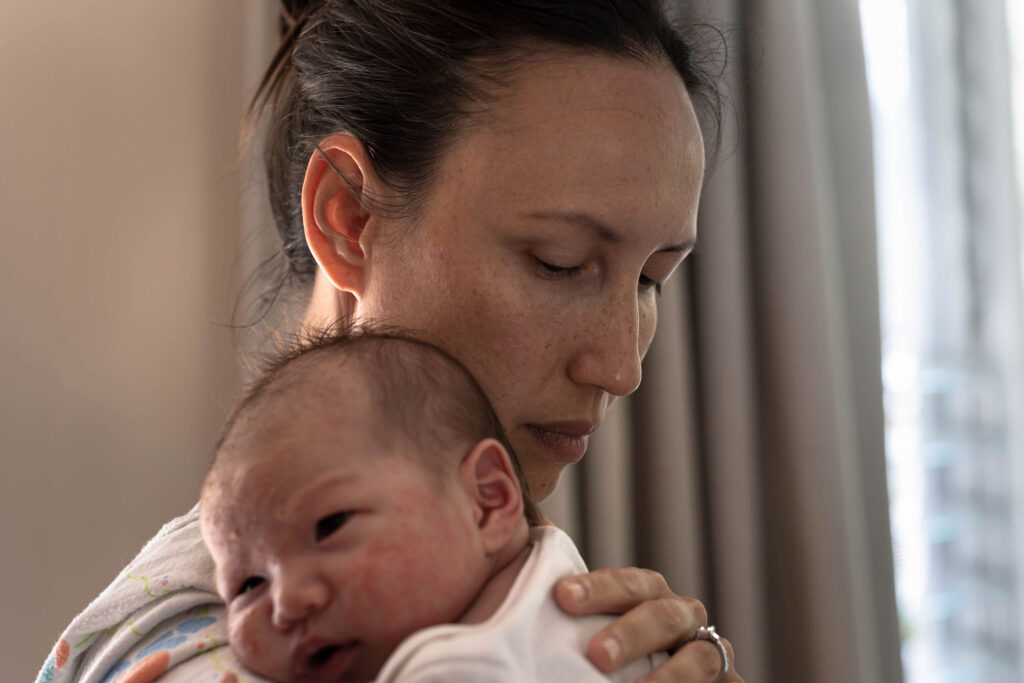Pregnancy and safe baby care
for all parents with idiopathic hypersomnia or narcolepsy type 1 or 2

for all parents with idiopathic hypersomnia or narcolepsy type 1 or 2
 This page is for people with hypersomnias (PWH) who are parenting babies or planning to become parents. Many PWH who are thinking about becoming parents have questions, such as whether their child might inherit a hypersomnia disorder, or how to safely parent a baby (age 0 to 3 years) while living with hypersomnia symptoms. PWH considering pregnancy and nursing may also have questions about managing medicines while keeping their baby healthy. To answer these questions, we asked OB/GYN, pediatrics, lactation, and sleep medicine experts to share their knowledge and recommendations.
This page is for people with hypersomnias (PWH) who are parenting babies or planning to become parents. Many PWH who are thinking about becoming parents have questions, such as whether their child might inherit a hypersomnia disorder, or how to safely parent a baby (age 0 to 3 years) while living with hypersomnia symptoms. PWH considering pregnancy and nursing may also have questions about managing medicines while keeping their baby healthy. To answer these questions, we asked OB/GYN, pediatrics, lactation, and sleep medicine experts to share their knowledge and recommendations.
Jump to page sections
 Create a support network
Create a support network A support network can help you care for your children. Think about what times of day your symptoms may make it difficult for you to care for your child and who can step in to help. Get together with other parents of small children to share childcare duties. Hire a “helper” to be with you at your home during times of day that you need to rest or are less alert.
A parenting plan lists the care that the child needs and who will provide that care. Parents, family members, neighbors, and any one else who cares for the child are included in the plan. For PWH who may have sudden worsening of symptoms, the plan should cover who will help on short notice. (Note: A written plan may protect you if you are legally challenged about your parenting ability during a divorce or social services custody case.)
Consider seeing a counselor or therapist to help improve your coping skills. Think about joining hypersomnia, pregnancy, parenting, or other support groups to help you feel connected and less alone as you go through these big life changes. For more information on these topics, visit our web page “Quality of life tips.” Some narcolepsy and pregnancy-specific support groups include:
If you’re working or going to school while parenting (or pregnant), you may need to change your schedule, work from home, or make other changes to continue to meet your health needs. Consider asking for work or school accommodations for your sleep disorder. Also, look into your workplace’s medical or parental leave and disability income policies in case your symptoms are more difficult to control with the extra demands of parenting. Visit our web pages:
 Experts don’t know for sure.
Experts don’t know for sure.
Researchers think that people with IH, NT1, and NT2 may be more likely to have children with other sleep disorders. This is because research shows that the general symptoms of sleepiness and long sleep seem to be at least partially familial.
Yes. Here’s some basic information about adopting when you have a hypersomnia sleep disorder:
 Talk with your doctors, ideally before pregnancy, about any treatment changes you might need. You may decide to lower your dose or stop taking medicines while you are trying to become pregnant in order to lower the chance of birth defects, which can happen early in pregnancy as the baby’s organs start forming.
Talk with your doctors, ideally before pregnancy, about any treatment changes you might need. You may decide to lower your dose or stop taking medicines while you are trying to become pregnant in order to lower the chance of birth defects, which can happen early in pregnancy as the baby’s organs start forming.
While trying to become pregnant, you may be able to take your medicines monthly for a period of days during your safety zone. The safety zone is the period of days during and just after menstruation (your period) and before a fertilized egg could implant in your uterus. To learn more, visit the “safety zone” section on our web page for doctors.
Visit Project Sleep’s Pregnancy & Narcolepsy resources, which include patient and doctor perspectives in text, audio, or video format.
Some people who have idiopathic hypersomnia or narcolepsy type 1 or 2 feel better during pregnancy. Others feel worse than usual. These changes may be related to hormones and may also vary by trimester. If you and your doctors decide to stop your hypersomnia medicines or lower your doses due to your pregnancy, this may also worsen your symptoms.
 Do I need any special monitoring during pregnancy because of my hypersomnia disorder?
Do I need any special monitoring during pregnancy because of my hypersomnia disorder?Yes. Your doctor should carefully monitor any changes caused by your pregnancy that can lead to worsened fatigue and sleepiness.
Watch for new disorders affecting sleep that can start during pregnancy, such as:
These normally go away soon after pregnancy, but treating them during your pregnancy may help you feel better.
Check for anemia with these blood tests:
 You may be able to take some of your hypersomnia medicines during pregnancy.
You may be able to take some of your hypersomnia medicines during pregnancy.
Tell your doctor about all medicines you take — not just those for hypersomnias — and discuss the risks and benefits of taking them during pregnancy. You may decide to:
Only you, with the help of your doctors, can weigh these risks to decide if you will stop or continue taking your medicines during pregnancy (including while you are trying to get pregnant). Making these decisions with your doctors is very important.
For detailed information, visit the section on our web page for doctors about the pregnancy risk profiles of common hypersomnia medicines.
If you still have concerns about taking medicines after talking with your OB/GYN and sleep doctor, you can see a maternal-fetal medicine (MFM) specialist. This is a specialist who’s expert in complex or high-risk pregnancies and can give more detail about the risks of medicines and hypersomnias on your baby. For more information or to help locate an MFM doctor near you, visit the Society for Maternal Fetal Medicine’s web page.
If you decide to continue taking medicine during pregnancy, it is very helpful to report this to a pregnancy exposure registry. These registries track the experiences of people who take medicines during pregnancy. Researchers then study the information to learn more about risks and benefits of medicines in pregnancy. To learn more, visit the U.S. FDA’s web page “Pregnancy Exposure Registries” and our table below.
| National Pregnancy Registry for Psychiatric Medications (for stimulants and antidepressants) | 1-866-961-2388 |
| Provigil and Nuvigil Pregnancy Registries (for modafinil and armodafinil) | 1-866-404-4106 |
| Sunosi Pregnancy Registry (for solriamfetol) | 1-877-283-6220 |
| Wakix Pregnancy Registry (for pitolisant) | 1-877-302-2813 |
|
Xyrem and Xywav REMS Program (for sodium and lower-sodium oxybate) You may report pregnancy complications here, but there isn’t an actual pregnancy registry. |
1-866–997-3688 |
|
Lumryz REMS program (for extended-release sodium oxybate) You may report pregnancy complications here, but there isn’t an actual pregnancy registry. |
1-877-453-1029 |
Many people with hypersomnias use caffeine to help their symptoms. Experts generally recommend limiting daily caffeine to 200 to 300 mg (about 2 to 3 6-ounce cups of coffee) during pregnancy and nursing due to possible risks to your baby. Weigh the risks and benefits as you do for prescription medicines.
It’s not likely that your hypersomnia, either idiopathic hypersomnia or narcolepsy type 1 or 2, will affect the birth of your baby.
If you have narcolepsy type 1 with cataplexy, you may be more likely to have a Cesarean delivery (C-section), but vaginal deliveries are still much more common. Cataplexy during delivery is rare. However, right after delivery cataplexy may be more likely due to the heightened emotions of childbirth, so you will need to take care when holding your baby for the first time.
Your symptoms (including your sleep needs) and any medicines you’ve continued can complicate both hospital stays and anesthesia. Visit our web page “Preparing for anesthesia, hospital stays, and medical emergencies” and work with your doctors to develop your personal “Anesthesia and hospital stay care plan” well in advance of delivery or other hospital stays.
Yes. Your sleep disorder could lower your milk supply. Your sleep disorder could also raise your risk of plugged milk ducts, which can lead to breast infections. If you take hypersomnia medicines, you will need to consider the risks and benefits of continuing them.
If you need to raise your milk supply, you can:
Your body may make less milk if your sleep schedule does not allow you to nurse or pump this often. The more you nurse or pump, the more milk you will make. Any parent who is unable to nurse their baby or pump at least 8 times in 24 hours is more likely to have a low milk supply.
Sleep flat on your back whenever possible, and make sure your bra fits your largest breast size well. Rolled towels can help you sleep on your back. Sleeping in other positions, where you may lay on your breasts, or wearing a bra that is too tight raises your risk of plugged milk ducts. This can lead to breast infections.
If you have a high milk supply, completely empty your breasts every time you nurse or pump. Record how often you nurse or pump, with a goal of 8 to 10 times every 24 hours. Nursing or pumping more often is likely to further raise your milk supply. You will have a higher risk of plugged milk ducts if you have a high milk supply and your sleep needs don’t allow you to remove your milk often enough. This can lead to breast infections.
Many medicines pass through to human milk, whether you’re nursing or pumping. For all medicines, weigh the possible risks for the baby against the known benefits of human milk for the baby and the benefits of the medicine for your health.
If you’re nursing or pumping, ask your doctors about the medicines you take, and if they can get into your milk supply. Make your own informed decision after talking with your doctors.
Researchers have done some studies on the effects of hypersomnia medicines on nursing, although some of the medicines have only been studied in very small numbers of nursing parents. While these studies do not completely rule out risks to your baby, doctors believe these medicines are most likely safe for nursing:
Oxybates (such as Xyrem, Xywav, and Lumryz)
These medicines are eliminated very quickly by your body, so you can safely take them while nursing if, and only if, you take special steps to avoid exposing your baby. Here are the steps:
For more details on nursing while taking these medicines, visit our web page for doctors.
Many parents are very motivated to give their baby human milk through nursing or pumping, and are happy to provide whatever milk they can produce. For more support, talk with a lactation consultant, a support organization, or your pediatrician, especially if:
 Most parents with a new baby are exhausted due to lack of sleep. A parent who has a hypersomnia is usually even more exhausted. In a study of 249 mothers with narcolepsy, 60% (6 out of 10) reported that their symptoms negatively affected care of their baby. These symptoms included:
Most parents with a new baby are exhausted due to lack of sleep. A parent who has a hypersomnia is usually even more exhausted. In a study of 249 mothers with narcolepsy, 60% (6 out of 10) reported that their symptoms negatively affected care of their baby. These symptoms included:
You may need help to prevent accidents, such as falls or drowning while bathing, especially if you have any of these symptoms.
You can safely sleep in the same room with your baby as long as you don’t sleep in the same bed. It’s not a good idea for anyone to sleep in the same bed or on the same surface with an infant (baby 1 year or younger). This could increase the chance of SIDS (sudden infant death syndrome), suffocation, or strangulation. Research has shown a high risk of infants becoming trapped or tangled in upholstered chairs, couches, and on beds with extra pillows and bedding when adults fall asleep, especially if the infant is 6 months or younger.
People with low alertness, difficulty waking up, or using a sedating medicine have a risk of infant sleep-related death during bed-sharing that is more than 10 times higher than the usual risk with bed-sharing. Therefore, you’re likely at very high risk if you:
For more information on safe sleeping for your baby, talk with your pediatrician.

Published May. 18, 2021 |
Revised Jan. 31, 2024
Complete update Jan. 22, 2024 |
Approved by our medical advisory board